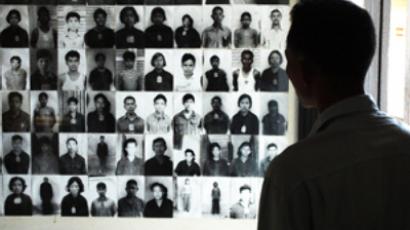Turkey and Armenia moving on
Turkey and Armenia have been bitter enemies for nearly a century. But despite the dispute over the genocide of Armenians, the two are poised to sign an agreement to open their borders, indicating their desire to move on.
Closed for more than 15 years, the frontier between Armenia and Turkey may finally be reopening.
The century-old feud stems from the massacre of hundreds of thousands of Armenians by Ottoman Turks during the First World War. But now Armenia and Turkey are putting the past aside for the future’s sake, making the first binding steps to re-establishing ties.
“When relations normalize – and I hope it’s a question of when and not if now – we will see a very fast growth in economic ties in, particularly, trade between Armenia and Turkey,” Boris Makarenko of the Moscow-based Center for Political Technologies told RT.
Armenian-Turkish Protocols
To be signed by Armenia’s Foreign Minister Edward Nalbandyan and his Turkish counterpart Ahmet Davutoglu on 8pm GMT, October 10, 2009.
Though the articles of the protocols are quite vague – for instance, “[Turkey and Armenia are] desiring to establish good neighborly relations and to develop bilateral cooperation in the political, economic, cultural and other fields for the benefit of their peoples” – some concrete actions are also described.
First and foremost it’s the opening of the common border, which is to be done within two months after the protocols are enforced (the first day of the first month following ratification).
Another action to be completed no later than within a month after the enforcement is the creation of an intergovernmental bilateral commission with sub-commissions dealing with every possible area of cooperation between the two countries.
That is significant in an area veined with oil and gas pipelines. Indeed, a secure Caucasus region is a priority for Russia and the US, who along with the EU support a pact between Armenia and Turkey.But as is often the case in this part of the world, history has played its part in negotiations and is the main reason previous talks have failed.
In 1915, the Ottoman Turkish army fighting against Russia sent its Armenian population on a so-called death march toward Syria. Armenians say up to 1.5 million people were killed in an act of genocide. The Turks reject this label and say the death toll is inflated.
It is an issue unlikely to be resolved soon, so for now it has been sidestepped in favor of promoting diplomatic ties for practical concerns.
Hayk Sargis Kotanjian, an Armenian-based doctor of political science, says the time has come to review the relations between the two states and peoples.
“The initiative is aimed at finding grounds for a dialogue concerning the new understanding of the interstate relations and establishment of diplomatic relations between Turkey and Armenia,” he explained.
While Armenians in their poor, isolated homeland welcome the opening up of trade, many in the vast Armenian diaspora have greeted the news with protest.
It was a strong message for the Armenian president, who last week visited Armenian communities in the US, France, Russia and Lebanon.
Many living outside Armenia are descendents of those who escaped the slaughter and say having diplomatic ties with Turkey is an insult.
But Suat Kiniklioglu – a member of the Turkish Parliament and Deputy Chair of External Affairs, says that the establishing of a history commission that would investigate into the events of 1915 and come up with a report and findings that would be binding for Turkey could become part of the normalization process.
“Wounds and scars will be overcome then – first need to establish diplomatic relations,” he said.
While Armenia has made concessions over the Armenian genocide, Turkey has also compromised on another thorny issue – Nagorno-Karabakh, a disputed region in Azerbaijan, which Armenia has de facto control over.
Turks and Azeris are close in culture and ethnicity, and so Turkey has always insisted that a solution over Nagorno-Karabakh precede any deal with Armenia.
Both parties have decided to set aside hostilities in favor of establishing better relations.
Now it is over to the parliaments of Armenia and Turkey, which will need to ratify the protocol for it to take force – something which is not guaranteed.













